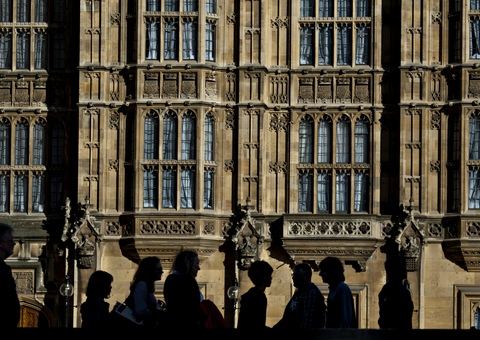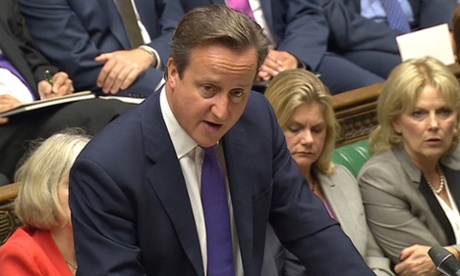No pause, no cooling off period, four Tornados hit six targets in Islamic State oilfields overnight as if the Commons might rescind its vote. Is this a momentous crossing of a Rubicon or a little mission creep? Oddly, both sides said both – and we don’t know.
Frontline reporters struggle to describe the multilayered complexity of Syrian battle lines, against crude simplicities in the Commons last night. The more experts from Royal United Services Institute (Rusi) or Chatham House analyse those 70,000 friendly forces, the further they vanish into the thin air of David Cameron’s magical thinking.
Hilary Benn’s rousing talk of Nazis and General Franco helps not one jot. Moral certainties we have in abundance, but how will they sound if the depressing reality is that ousting Isis can only be done with filthy moral compromise with Iran, Vladimir Putin and murderous Bashar al-Assad?
You can feel the familiar tug, the emotional call of fife and drum. How good the cause always sounds. The enemy is so unspeakable that to do nothing is unthinkable. This time Isis is probably the best enemy since Hitler for rousing us to defend of our civilisation against barbarism: they attack us here.
There have been many enemies in recent decades, from Saddam, to Assad, to Gaddafi, Milosevic or Galtieri – all worthy icons of evil, mass killers, despots, moral monsters. But what of the other despots real politik requires us to welcome as friends, rolling out red carpets for tyrants whose victims it’s more convenient to ignore? Beware a moral fervour stirring the blood for war, but so easily switched off when it suits. Benn should remember the fate of Labour’s 1997 promise of an “ethical foreign policy”. Tony Blair was right in his famous Chicago speech to say that because we can’t intervene everywhere that’s no reason not to rescue people from oppression when we can – but he soon found how hard it is to know when we can: good quick wins in Kosovo and Sierra Leone misled him into the Iraq catastrophe with these unending consequences.
The case for war that tugs hardest is the plea for support from our good friends in Paris and Washington, best made by Margaret Beckett appealing to Labour internationalism – on Cameron’s lips, solidarity with the despised François Hollande sounds like a hollow excuse, not a genuine reason why. Cameron’s best case in his speech was for us not to “outsource” the task of ridding the world of this great peril to others, or “doing our bit” as Benn put it in rather 1914 language.
No doubt some genuine agonies were felt in the Commons. But many were fighting other wars. The phalanx of 66 Labour MPs voting with Cameron were part motivated by gesturing against Corbyn. That’s not selfish sectarianism but realistic fear that Labour may never survive the Corbyn era. Benn and other senior figures’ call to war was a bid for Labour to be taken seriously, not as a rabble of permanent protesters. To vote for war is grown-up politics about Britain’s place in the world, a solid reminder of what Labour in power used to feel like. But that political imperative still doesn’t make it right to join the vortex of Syria.
Some Labour MPs may have been intimidated into voting with Corbyn: sinister threats came from some Momentum protesters yesterday. Many MPs calculated the outcome: the government says bombing will last over a year, (at £100,000 per Brimstone). How soon will an already doubting public tire of it?
Cameron too bombs with political purpose – to stay at the top table. His “bunch of terrorist sympathisers” jibe showed his bombs are also aimed down Labour’s chimney. Most admirable was the small squad of Tory refuseniks, led by David Davis – but then he does enjoy rebellion. As for Tim Farron’s emotive plea for bombing, you can bet that if Labour were led by a warrior, he would take his Lib Dems against war hoping to reprise Charles Kennedy’s anti-war success. Instead, opposing Corbyn on behalf of refugees was a clever trope to define himself against Labour. Those are just some of the proxy wars lurking beneath much moral talk last night.
For a dose of blood-chilling reality about the morass we are entering, read the Financial Times this week on how Isis procures its weaponry. “The best sources of ammunition are Isis’s enemies.” Pro-government Iraqi militia sell supplies to black marketeers, who sell on to Isis. Gulf backers send in truckloads of munitions, while Turkish companies sell Isis explosives. Isis buys weapons via dealers from Assad forces, anti-Assad rebels and the Iraqi army. Our friends the Free Syrian Army want missiles to shoot down Russian planes bombing it: what then? The Turks, our Nato allies, are bombing our Kurdish allies as they seize land from Isis. That’s the real nightmare war we are joining.











